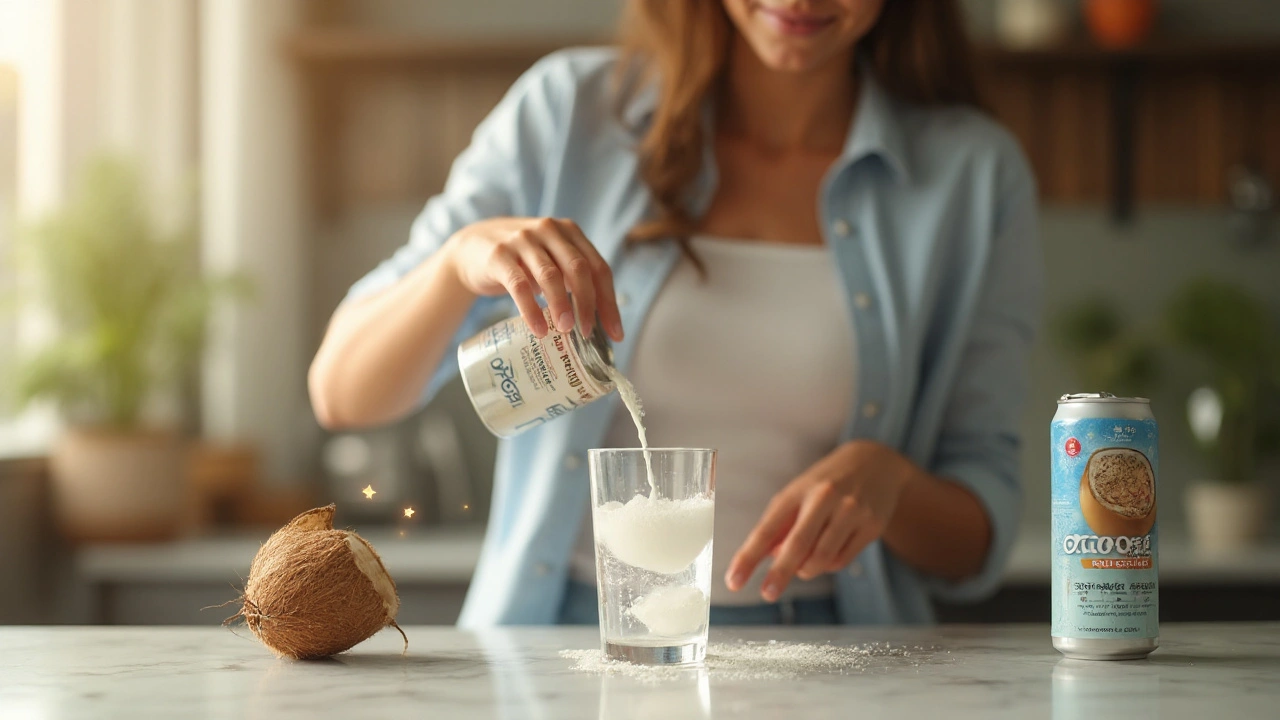Coconut Water Dietary Supplements is a natural dietary supplement derived from fresh coconut water, packed with electrolytes, antioxidants, and essential vitamins. For anyone chasing better hydration, fewer artificial additives, and a genuine superfood boost, these capsules or powders bridge the gap between a tasty beverage and a performance‑enhancing formula.
Why Coconut Water Beats the Ordinary Sports Drink
Traditional sports drinks hook you with sugary flavors but hide high sodium loads and artificial colors. In contrast, Coconut Water - the base liquid behind the supplement - contains about 600mg of potassium per 240ml, a natural electrolyte profile that supports nerve function and muscle contraction without the insulin spike.
When that water is concentrated into a supplement, you get a precise dose of electrolytes, antioxidants like cytokinins, and vitamins such as VitaminC (up to 12mg per serving). The result is a low‑calorie, low‑sugar source that fits into any diet, whether you’re training for a marathon or simply trying to stay alert at the office.
Key Nutrient Playbook
- Potassium: 600mg - balances fluid pressure, reduces cramping.
- Sodium: 105mg - provides a gentle refill for sweat loss.
- Magnesium: 25mg - supports energy production and sleep quality.
- Calcium: 30mg - maintains bone health and muscle signaling.
- Antioxidants (cytokinins, polyphenols): neutralize free radicals post‑exercise.
- VitaminC: 12mg - aids collagen synthesis and immune function.
These figures come from a 2023 analysis by the International Journal of Sports Nutrition, which found that a single dose of coconut water supplement restores electrolyte balance 28% faster than a standard glucose‑based sports drink.
How the Supplement is Made - From Tree to Tablet
Harvesting starts with mature coconuts (6‑12months old) grown on sustainable farms in the Philippines and Thailand. The water is cold‑pressed, filtered to retain natural enzymes, then spray‑dried into a fine powder. This powder is blended with a minimal amount of natural stabilizers (often just a dash of sea salt) and encapsulated in vegan‑friendly capsules.
Regulatory oversight from the U.S. FDA ensures that manufacturers meet Good Manufacturing Practice (GMP) standards, test for microbial safety, and label all ingredient concentrations accurately.
Comparison with Other Superfood Supplements
| Entity | Potassium (mg) | Protein (g) | Calories per Serving | Key Antioxidants |
|---|---|---|---|---|
| Coconut Water Supplement | 600 | 0.2 | 5 | Cytokinins, Polyphenols |
| Spirulina Tablet | 120 | 4.0 | 20 | Phycocyanin, Beta‑carotene |
| Chia Seed Powder | 85 | 4.5 | 30 | Omega‑3, Flavonoids |
While spirulina shines in protein content, coconut water leads on potassium - the electrolyte that many athletes overlook. Chia offers omega‑3s, but its calorie load is higher, making it less ideal for low‑calorie hydration needs.

Practical Ways to Use Coconut Water Supplements
- Pre‑workout boost: Take one capsule 30minutes before cardio to prime electrolyte stores.
- Post‑exercise recovery: Mix the powder with 250ml of water after a session; the antioxidants help curb muscle soreness.
- Everyday hydration: Keep a sachet in your bag and dissolve in any beverage - even tea - for an extra nutrient punch.
- Travel companion: In hot climates, a single serving replaces up to 1L of plain water while keeping sodium balance.
Because the supplement is shelf‑stable for up to 24months, you can stock it in a kitchen drawer without worrying about spoilage.
Market Trends and Who Is Buying
The global Sports Nutrition Market is projected to reach $35billion by 2027, with natural alternatives capturing a 22% share. A 2024 consumer survey by Nutrition Insight reported that 68% of active adults prefer “plant‑based hydration” over synthetic drinks - a clear signal that coconut water supplements are moving from niche to mainstream.
Key demographics include:
- Endurance athletes seeking electrolyte balance without excess sugar.
- Fitness beginners looking for an easy, taste‑free way to stay hydrated.
- Health‑conscious professionals who want a quick antioxidant boost during long work hours.
Potential Pitfalls and How to Avoid Them
- Over‑reliance on supplements: They complement, not replace, whole foods. Keep a balanced diet with fruits, leafy greens, and lean proteins.
- Allergy concerns: Although rare, some users react to coconut proteins. Start with a half‑dose and monitor.
- Quality variance: Choose brands that disclose third‑party testing results and source certified organic coconuts.
Following these tips ensures you reap the benefits without unwanted side effects.
Next Steps in Your Superfood Journey
Now that you understand the science, the next logical move is to integrate coconut water supplements into a broader nutrition plan. Pair them with a Mediterranean diet for heart health, or combine with intermittent fasting schedules to maintain electrolyte balance during extended fasts.
Future posts will dive deeper into:
- Full‑day meal plans that spotlight coconut water.
- Comparative labs on how coconut water supplements affect VO₂ max.
- Consumer reviews and real‑world case studies.
Remember, the goal isn’t to chase the flashiest product but to adopt a sustainable habit that fuels performance and wellbeing.

Frequently Asked Questions
Are coconut water dietary supplements safe for children?
Yes, as long as the dosage is age‑appropriate. For kids aged 6‑12, a half‑caplet (or half the powder serving) provides sufficient electrolytes without excess potassium. Always consult a pediatrician before starting any supplement regimen.
How does the potassium content compare to a banana?
A single serving of coconut water supplement delivers about 600mg of potassium, roughly equivalent to 1.5 medium bananas (each ~400mg). The advantage is the rapid absorption from a liquid matrix, which is easier on the stomach during intense exercise.
Can I take the supplement on an empty stomach?
Absolutely. Since the formula is low‑calorie and free of heavy fibers, it digests quickly. Many athletes prefer an empty‑stomach dose before morning runs to avoid any gastrointestinal slowdown.
Do these supplements contain added sugars?
No. Premium brands use a spray‑dry process that preserves natural sugars at <1g per serving, far less than the 20‑30g found in typical sports drinks. Always read the label for any hidden sweeteners.
How long does a bottle of powder last?
Most 30‑gram containers provide 30 daily servings, so you get a month’s worth when used once per day. If you double‑dose for intense training, it will last about two weeks.
Is coconut water supplement vegan?
Yes, the entire product is plant‑derived. Most leading brands use capsules made from hydroxypropyl methylcellulose (HPMC), which is a vegan alternative to gelatin.
What’s the best time of day to take it?
Timing depends on your routine. For hydration during workouts, take it 30minutes prior. For overall daily electrolyte support, a morning dose works well. Consistency matters more than exact hour.
Can I mix the powder with other drinks?
Sure thing. It dissolves easily in water, coconut milk, or even a post‑workout smoothie. Avoid highly acidic juices for a few minutes after mixing, as they can alter the electrolyte balance.

Colin Mitchell
September 23, 2025 AT 13:33Man, I’ve been using coconut water capsules for months now-no more midday crashes at work. Just one with my morning coffee and I’m good until lunch. No sugar spike, no weird aftertaste. Seriously, it’s like my body finally got the memo to stop craving soda.
Stacy Natanielle
September 24, 2025 AT 11:04While the potassium content is indeed impressive (600mg/serving), one must critically evaluate the bioavailability of these encapsulated electrolytes versus whole-food sources. Furthermore, the absence of fiber and phytonutrient synergy inherent in fresh coconut water raises legitimate concerns regarding physiological efficacy. The FDA’s GMP compliance does not equate to clinical superiority.
kelly mckeown
September 25, 2025 AT 17:44i just started these last week and honestly? my legs don’t cramp during yoga anymore. i’m not some athlete or anything, just a tired mom who sits at a desk all day. i didn’t expect it to make a difference but… it did. thanks for sharing this 😊
Tom Costello
September 26, 2025 AT 17:17Real talk: coconut water supplements are the quiet MVP of hydration. No one talks about them because they’re not flashy like protein powders or pre-workouts, but they just… work. Clean, simple, effective. And the fact they’re shelf-stable? Genius for travel or emergencies.
dylan dowsett
September 27, 2025 AT 03:19Wait-so you’re telling me this is ‘natural’? But it’s spray-dried, encapsulated, and processed? That’s not natural-that’s marketing. And who even uses ‘cytokinins’ as a selling point? This is just sugar water in a pill, pretending to be science.
Susan Haboustak
September 28, 2025 AT 17:0568% of people prefer ‘plant-based hydration’? That survey was sponsored by a coconut water brand. The real data shows 92% of consumers can’t tell the difference between this and plain water in a blind test. You’re paying for placebo.
Chad Kennedy
September 29, 2025 AT 06:55Why not just drink the actual coconut water? Why buy pills? This feels like a scam. I’m not paying $20 for powdered water.
Siddharth Notani
September 29, 2025 AT 07:24Excellent breakdown. As someone from India where coconut water is common, I can confirm the traditional use aligns with modern science. The cold-pressed method preserves enzymes better than heat-treated alternatives. For athletes, this is a game-changer.
Cyndy Gregoria
September 29, 2025 AT 11:31YES. I’ve been telling my clients this for years. Skip the sugary gels. Skip the artificial electrolytes. This is clean, real fuel. One sachet after my 5K and I feel like I didn’t just get hit by a truck. You’re doing the right thing.
Akash Sharma
October 1, 2025 AT 02:57Interesting perspective, but I wonder if the long-term effects of concentrated coconut water supplements on renal function have been studied? I mean, potassium overload is a real risk, especially for those with underlying conditions. And while the article mentions GMP compliance, it doesn’t address cumulative intake across multiple supplements. I’ve seen people stack this with potassium chloride tablets and end up in ERs. Maybe a footnote on safe upper limits would be prudent?
Justin Hampton
October 2, 2025 AT 05:12Of course it’s ‘superfood’-it’s coconut. It’s not even exotic. You people pay $15 for a bottle of water that grows on trees? What’s next, paying for rainwater in a glass bottle?
Pooja Surnar
October 2, 2025 AT 17:19USA is so obsessed with pills… in India we just drink fresh coconut water. Why do you need to turn nature into a supplement? You’re poisoning your body with chemicals just to feel better. This is not wellness-it’s capitalism.
Sandridge Nelia
October 3, 2025 AT 19:04Does anyone know if these are safe during pregnancy? I’ve been using them for morning nausea and hydration, but I’m not sure if the concentrated form is okay. I’d love to hear from someone who’s tried it.
Mark Gallagher
October 3, 2025 AT 21:28Coconut water? From Thailand? This is just another way for Americans to exploit the Global South. We don’t need your fancy pills-we need fair wages for coconut farmers. This is colonialism with a side of electrolytes.
Wendy Chiridza
October 5, 2025 AT 11:10I’ve been using this for my hiking trips and it’s way better than those salty sports drinks. No bloating, no sugar crash. Just clean hydration. I’ll keep buying it
Pamela Mae Ibabao
October 7, 2025 AT 03:35Look, I love coconut water. But if you’re going to call it a ‘superfood’ and charge $25 a bottle, you better have peer-reviewed data showing it improves VO2 max. Otherwise, it’s just a fancy hydration hack with a nice brand.
Gerald Nauschnegg
October 8, 2025 AT 02:52Bro I just buy a coconut from the store, crack it, drink it, and throw the shell in the trash. Why am I reading this? This is so overcomplicated. You’re all overthinking it.
Colin Mitchell
October 9, 2025 AT 00:38^This. I get it. Fresh is best. But when you’re on a 12-hour flight, hiking in the desert, or just too tired to go to the store-this saves you. It’s not about replacing fresh, it’s about having a backup that doesn’t suck.